International HRM: Navigating China's Culture & PESTEL for Amcor
VerifiedAdded on 2023/06/18
|8
|2521
|480
Report
AI Summary
This report provides an analysis of International Human Resource Management (IHRM) considerations for Amcor plc in China, focusing on the impact of Chinese national culture and the PESTEL (Political, Economic, Social, Technological, Environmental, and Legal) framework. It identifies key cultural dimensions based on Hofstede's model, including power distance, individualism vs. collectivism, masculinity vs. femininity, uncertainty avoidance, long-term orientation, and indulgence vs. restraint. The report also examines the political and economic landscape of China, highlighting the importance of adapting HRM practices to align with local norms and regulations. Recommendations for Amcor plc include embracing collectivism, leveraging e-commerce opportunities, and remaining adaptable to China's dynamic political environment. The analysis emphasizes the significance of cultural sensitivity and strategic alignment for successful business operations in China.
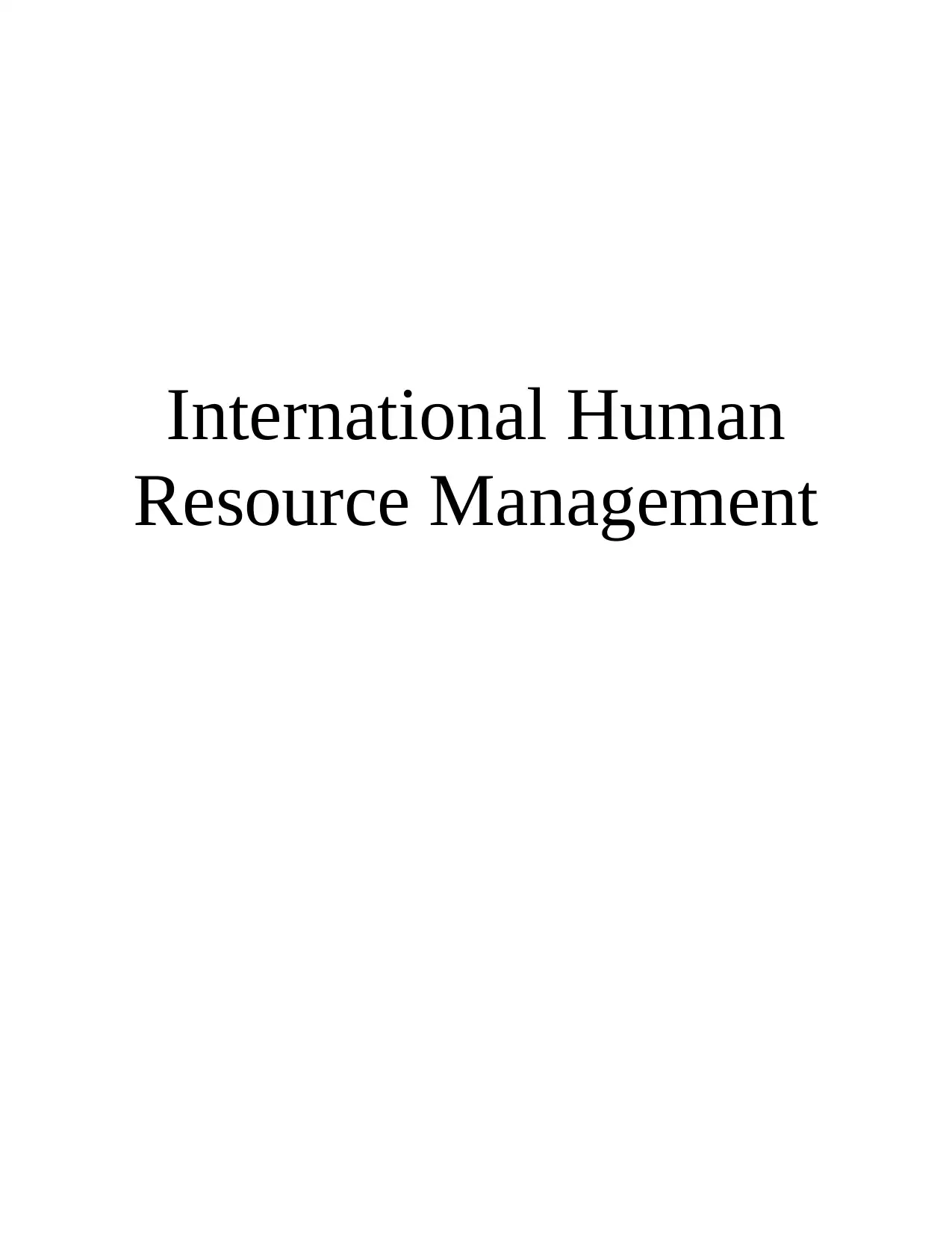
International Human
Resource Management
Resource Management
Paraphrase This Document
Need a fresh take? Get an instant paraphrase of this document with our AI Paraphraser
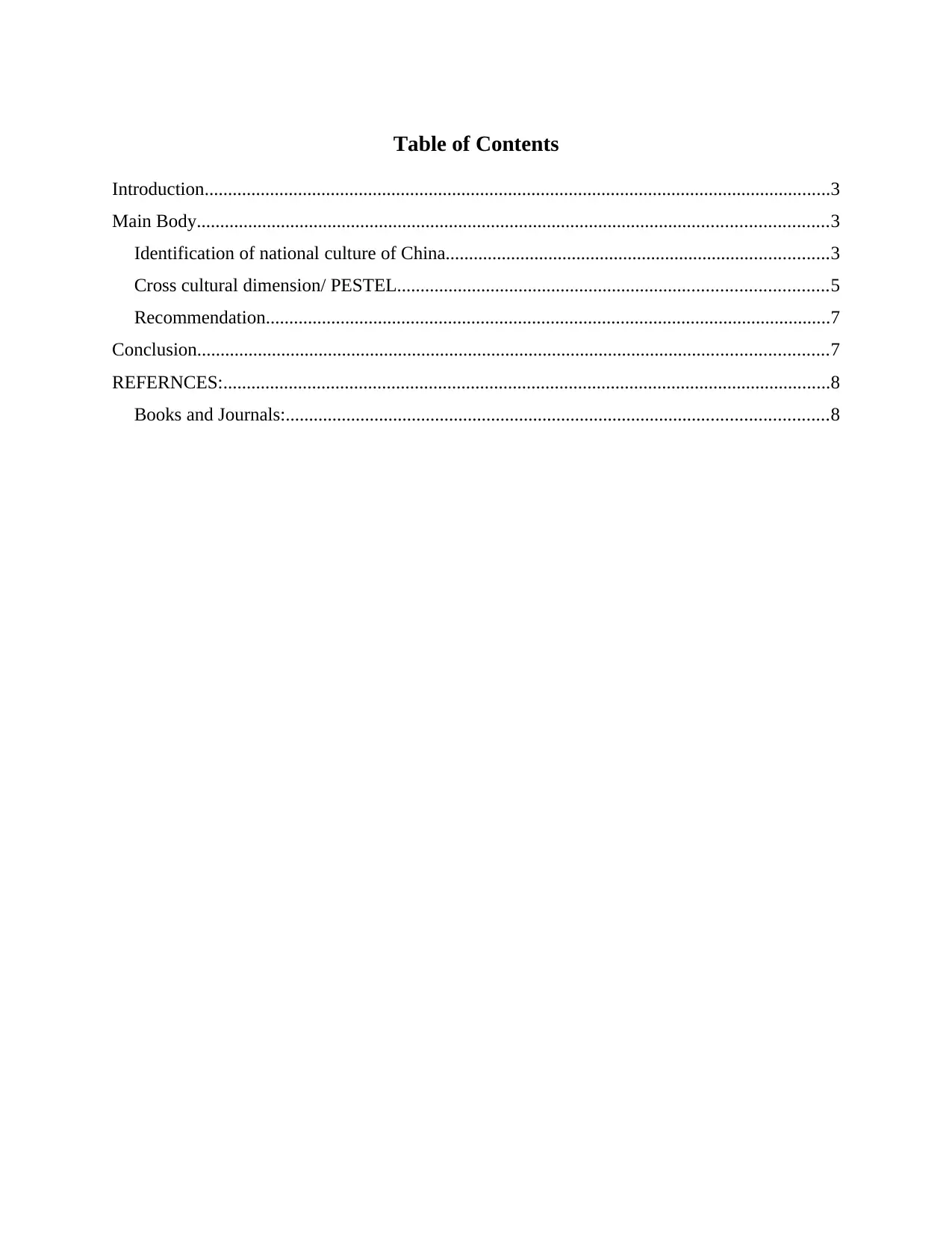
Table of Contents
Introduction......................................................................................................................................3
Main Body.......................................................................................................................................3
Identification of national culture of China..................................................................................3
Cross cultural dimension/ PESTEL............................................................................................5
Recommendation.........................................................................................................................7
Conclusion.......................................................................................................................................7
REFERNCES:..................................................................................................................................8
Books and Journals:....................................................................................................................8
Introduction......................................................................................................................................3
Main Body.......................................................................................................................................3
Identification of national culture of China..................................................................................3
Cross cultural dimension/ PESTEL............................................................................................5
Recommendation.........................................................................................................................7
Conclusion.......................................................................................................................................7
REFERNCES:..................................................................................................................................8
Books and Journals:....................................................................................................................8
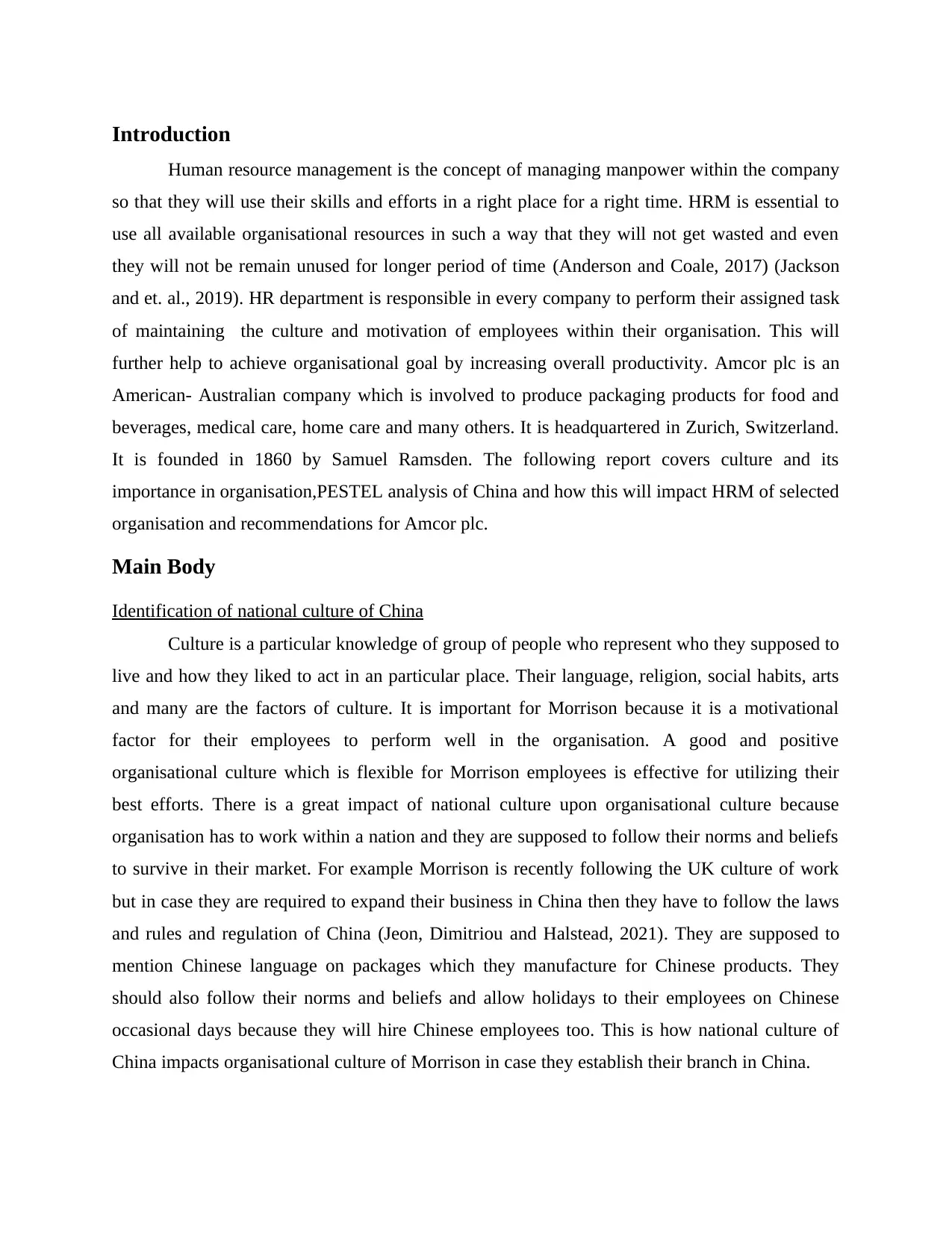
Introduction
Human resource management is the concept of managing manpower within the company
so that they will use their skills and efforts in a right place for a right time. HRM is essential to
use all available organisational resources in such a way that they will not get wasted and even
they will not be remain unused for longer period of time (Anderson and Coale, 2017) (Jackson
and et. al., 2019). HR department is responsible in every company to perform their assigned task
of maintaining the culture and motivation of employees within their organisation. This will
further help to achieve organisational goal by increasing overall productivity. Amcor plc is an
American- Australian company which is involved to produce packaging products for food and
beverages, medical care, home care and many others. It is headquartered in Zurich, Switzerland.
It is founded in 1860 by Samuel Ramsden. The following report covers culture and its
importance in organisation,PESTEL analysis of China and how this will impact HRM of selected
organisation and recommendations for Amcor plc.
Main Body
Identification of national culture of China
Culture is a particular knowledge of group of people who represent who they supposed to
live and how they liked to act in an particular place. Their language, religion, social habits, arts
and many are the factors of culture. It is important for Morrison because it is a motivational
factor for their employees to perform well in the organisation. A good and positive
organisational culture which is flexible for Morrison employees is effective for utilizing their
best efforts. There is a great impact of national culture upon organisational culture because
organisation has to work within a nation and they are supposed to follow their norms and beliefs
to survive in their market. For example Morrison is recently following the UK culture of work
but in case they are required to expand their business in China then they have to follow the laws
and rules and regulation of China (Jeon, Dimitriou and Halstead, 2021). They are supposed to
mention Chinese language on packages which they manufacture for Chinese products. They
should also follow their norms and beliefs and allow holidays to their employees on Chinese
occasional days because they will hire Chinese employees too. This is how national culture of
China impacts organisational culture of Morrison in case they establish their branch in China.
Human resource management is the concept of managing manpower within the company
so that they will use their skills and efforts in a right place for a right time. HRM is essential to
use all available organisational resources in such a way that they will not get wasted and even
they will not be remain unused for longer period of time (Anderson and Coale, 2017) (Jackson
and et. al., 2019). HR department is responsible in every company to perform their assigned task
of maintaining the culture and motivation of employees within their organisation. This will
further help to achieve organisational goal by increasing overall productivity. Amcor plc is an
American- Australian company which is involved to produce packaging products for food and
beverages, medical care, home care and many others. It is headquartered in Zurich, Switzerland.
It is founded in 1860 by Samuel Ramsden. The following report covers culture and its
importance in organisation,PESTEL analysis of China and how this will impact HRM of selected
organisation and recommendations for Amcor plc.
Main Body
Identification of national culture of China
Culture is a particular knowledge of group of people who represent who they supposed to
live and how they liked to act in an particular place. Their language, religion, social habits, arts
and many are the factors of culture. It is important for Morrison because it is a motivational
factor for their employees to perform well in the organisation. A good and positive
organisational culture which is flexible for Morrison employees is effective for utilizing their
best efforts. There is a great impact of national culture upon organisational culture because
organisation has to work within a nation and they are supposed to follow their norms and beliefs
to survive in their market. For example Morrison is recently following the UK culture of work
but in case they are required to expand their business in China then they have to follow the laws
and rules and regulation of China (Jeon, Dimitriou and Halstead, 2021). They are supposed to
mention Chinese language on packages which they manufacture for Chinese products. They
should also follow their norms and beliefs and allow holidays to their employees on Chinese
occasional days because they will hire Chinese employees too. This is how national culture of
China impacts organisational culture of Morrison in case they establish their branch in China.
⊘ This is a preview!⊘
Do you want full access?
Subscribe today to unlock all pages.

Trusted by 1+ million students worldwide
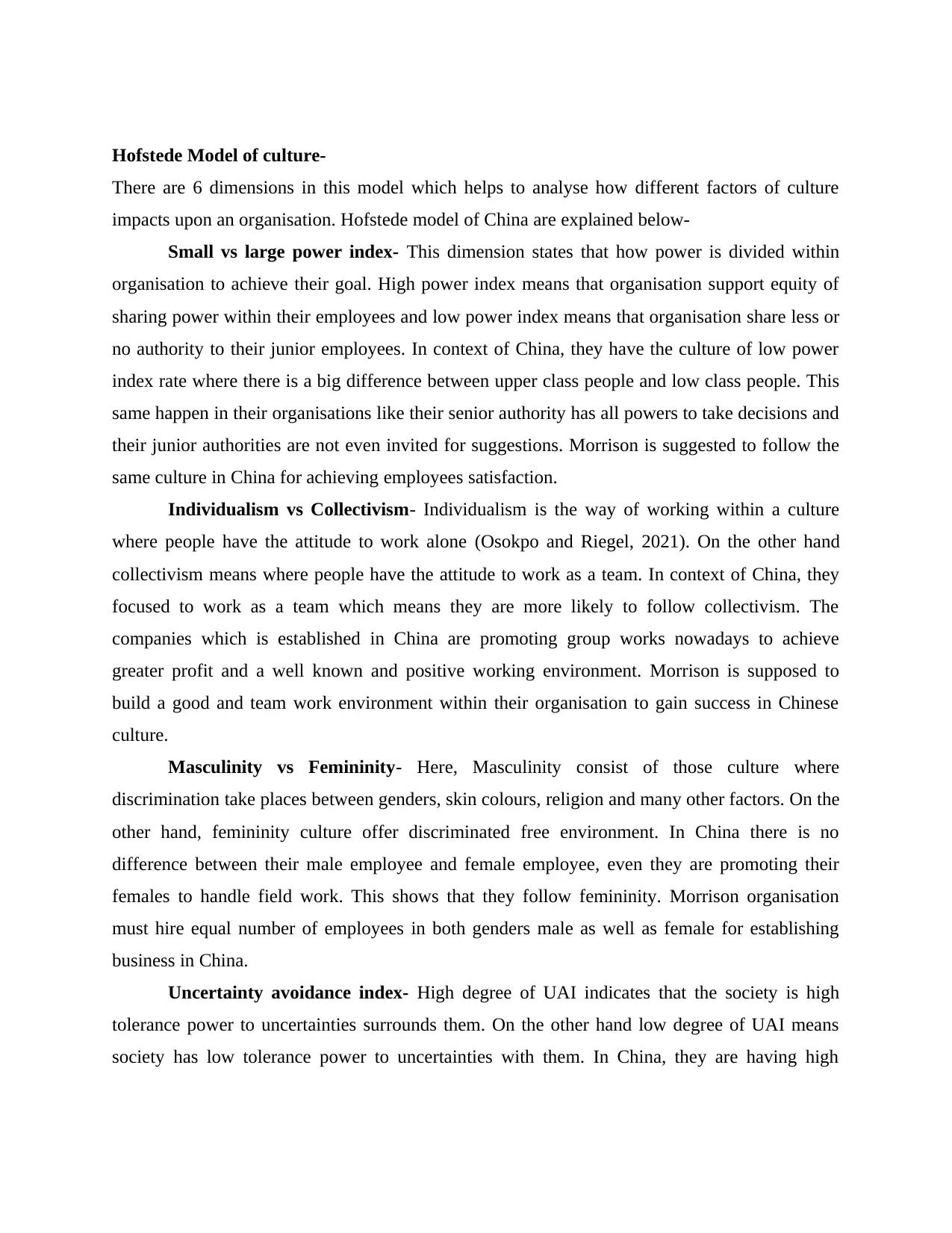
Hofstede Model of culture-
There are 6 dimensions in this model which helps to analyse how different factors of culture
impacts upon an organisation. Hofstede model of China are explained below-
Small vs large power index- This dimension states that how power is divided within
organisation to achieve their goal. High power index means that organisation support equity of
sharing power within their employees and low power index means that organisation share less or
no authority to their junior employees. In context of China, they have the culture of low power
index rate where there is a big difference between upper class people and low class people. This
same happen in their organisations like their senior authority has all powers to take decisions and
their junior authorities are not even invited for suggestions. Morrison is suggested to follow the
same culture in China for achieving employees satisfaction.
Individualism vs Collectivism- Individualism is the way of working within a culture
where people have the attitude to work alone (Osokpo and Riegel, 2021). On the other hand
collectivism means where people have the attitude to work as a team. In context of China, they
focused to work as a team which means they are more likely to follow collectivism. The
companies which is established in China are promoting group works nowadays to achieve
greater profit and a well known and positive working environment. Morrison is supposed to
build a good and team work environment within their organisation to gain success in Chinese
culture.
Masculinity vs Femininity- Here, Masculinity consist of those culture where
discrimination take places between genders, skin colours, religion and many other factors. On the
other hand, femininity culture offer discriminated free environment. In China there is no
difference between their male employee and female employee, even they are promoting their
females to handle field work. This shows that they follow femininity. Morrison organisation
must hire equal number of employees in both genders male as well as female for establishing
business in China.
Uncertainty avoidance index- High degree of UAI indicates that the society is high
tolerance power to uncertainties surrounds them. On the other hand low degree of UAI means
society has low tolerance power to uncertainties with them. In China, they are having high
There are 6 dimensions in this model which helps to analyse how different factors of culture
impacts upon an organisation. Hofstede model of China are explained below-
Small vs large power index- This dimension states that how power is divided within
organisation to achieve their goal. High power index means that organisation support equity of
sharing power within their employees and low power index means that organisation share less or
no authority to their junior employees. In context of China, they have the culture of low power
index rate where there is a big difference between upper class people and low class people. This
same happen in their organisations like their senior authority has all powers to take decisions and
their junior authorities are not even invited for suggestions. Morrison is suggested to follow the
same culture in China for achieving employees satisfaction.
Individualism vs Collectivism- Individualism is the way of working within a culture
where people have the attitude to work alone (Osokpo and Riegel, 2021). On the other hand
collectivism means where people have the attitude to work as a team. In context of China, they
focused to work as a team which means they are more likely to follow collectivism. The
companies which is established in China are promoting group works nowadays to achieve
greater profit and a well known and positive working environment. Morrison is supposed to
build a good and team work environment within their organisation to gain success in Chinese
culture.
Masculinity vs Femininity- Here, Masculinity consist of those culture where
discrimination take places between genders, skin colours, religion and many other factors. On the
other hand, femininity culture offer discriminated free environment. In China there is no
difference between their male employee and female employee, even they are promoting their
females to handle field work. This shows that they follow femininity. Morrison organisation
must hire equal number of employees in both genders male as well as female for establishing
business in China.
Uncertainty avoidance index- High degree of UAI indicates that the society is high
tolerance power to uncertainties surrounds them. On the other hand low degree of UAI means
society has low tolerance power to uncertainties with them. In China, they are having high
Paraphrase This Document
Need a fresh take? Get an instant paraphrase of this document with our AI Paraphraser
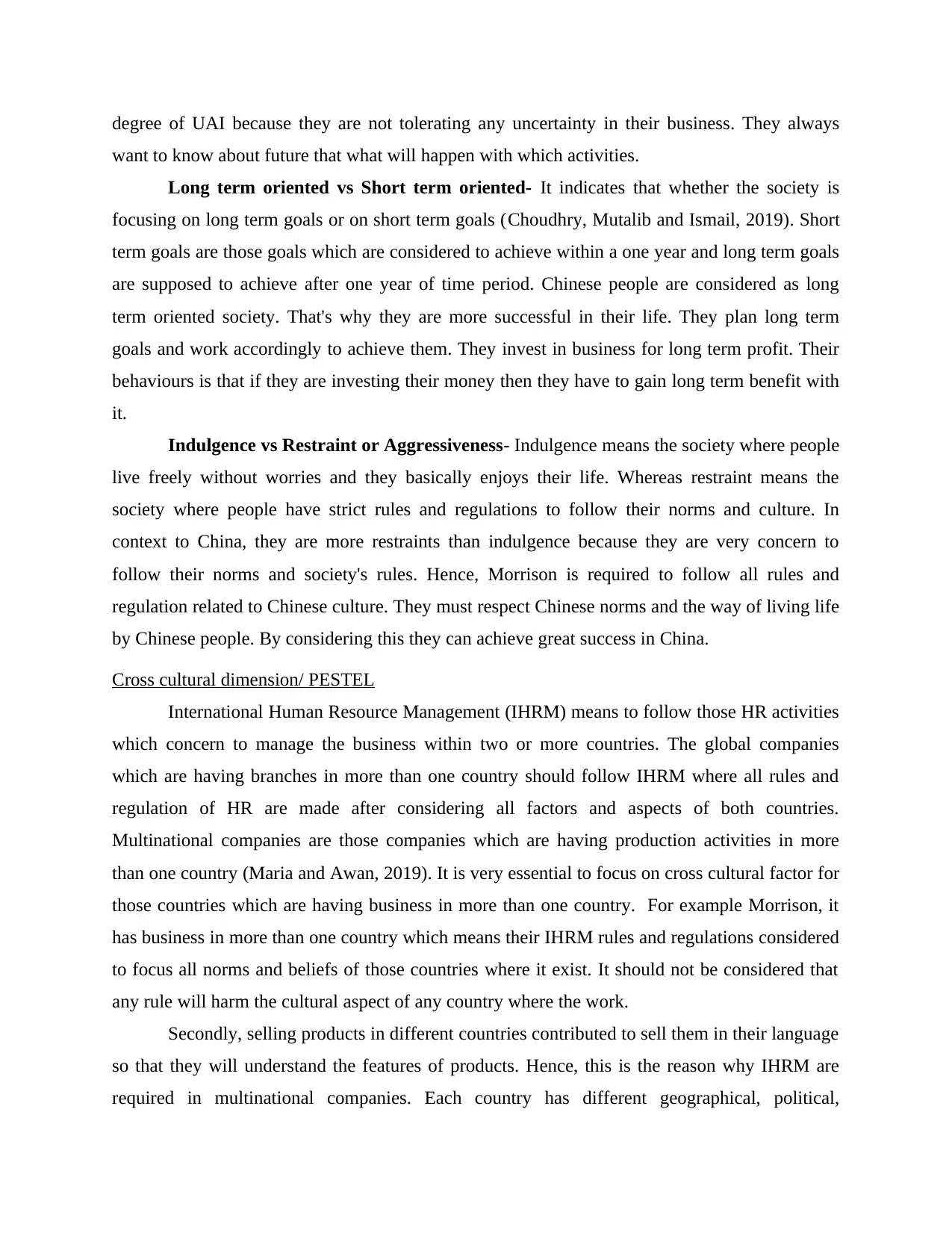
degree of UAI because they are not tolerating any uncertainty in their business. They always
want to know about future that what will happen with which activities.
Long term oriented vs Short term oriented- It indicates that whether the society is
focusing on long term goals or on short term goals (Choudhry, Mutalib and Ismail, 2019). Short
term goals are those goals which are considered to achieve within a one year and long term goals
are supposed to achieve after one year of time period. Chinese people are considered as long
term oriented society. That's why they are more successful in their life. They plan long term
goals and work accordingly to achieve them. They invest in business for long term profit. Their
behaviours is that if they are investing their money then they have to gain long term benefit with
it.
Indulgence vs Restraint or Aggressiveness- Indulgence means the society where people
live freely without worries and they basically enjoys their life. Whereas restraint means the
society where people have strict rules and regulations to follow their norms and culture. In
context to China, they are more restraints than indulgence because they are very concern to
follow their norms and society's rules. Hence, Morrison is required to follow all rules and
regulation related to Chinese culture. They must respect Chinese norms and the way of living life
by Chinese people. By considering this they can achieve great success in China.
Cross cultural dimension/ PESTEL
International Human Resource Management (IHRM) means to follow those HR activities
which concern to manage the business within two or more countries. The global companies
which are having branches in more than one country should follow IHRM where all rules and
regulation of HR are made after considering all factors and aspects of both countries.
Multinational companies are those companies which are having production activities in more
than one country (Maria and Awan, 2019). It is very essential to focus on cross cultural factor for
those countries which are having business in more than one country. For example Morrison, it
has business in more than one country which means their IHRM rules and regulations considered
to focus all norms and beliefs of those countries where it exist. It should not be considered that
any rule will harm the cultural aspect of any country where the work.
Secondly, selling products in different countries contributed to sell them in their language
so that they will understand the features of products. Hence, this is the reason why IHRM are
required in multinational companies. Each country has different geographical, political,
want to know about future that what will happen with which activities.
Long term oriented vs Short term oriented- It indicates that whether the society is
focusing on long term goals or on short term goals (Choudhry, Mutalib and Ismail, 2019). Short
term goals are those goals which are considered to achieve within a one year and long term goals
are supposed to achieve after one year of time period. Chinese people are considered as long
term oriented society. That's why they are more successful in their life. They plan long term
goals and work accordingly to achieve them. They invest in business for long term profit. Their
behaviours is that if they are investing their money then they have to gain long term benefit with
it.
Indulgence vs Restraint or Aggressiveness- Indulgence means the society where people
live freely without worries and they basically enjoys their life. Whereas restraint means the
society where people have strict rules and regulations to follow their norms and culture. In
context to China, they are more restraints than indulgence because they are very concern to
follow their norms and society's rules. Hence, Morrison is required to follow all rules and
regulation related to Chinese culture. They must respect Chinese norms and the way of living life
by Chinese people. By considering this they can achieve great success in China.
Cross cultural dimension/ PESTEL
International Human Resource Management (IHRM) means to follow those HR activities
which concern to manage the business within two or more countries. The global companies
which are having branches in more than one country should follow IHRM where all rules and
regulation of HR are made after considering all factors and aspects of both countries.
Multinational companies are those companies which are having production activities in more
than one country (Maria and Awan, 2019). It is very essential to focus on cross cultural factor for
those countries which are having business in more than one country. For example Morrison, it
has business in more than one country which means their IHRM rules and regulations considered
to focus all norms and beliefs of those countries where it exist. It should not be considered that
any rule will harm the cultural aspect of any country where the work.
Secondly, selling products in different countries contributed to sell them in their language
so that they will understand the features of products. Hence, this is the reason why IHRM are
required in multinational companies. Each country has different geographical, political,
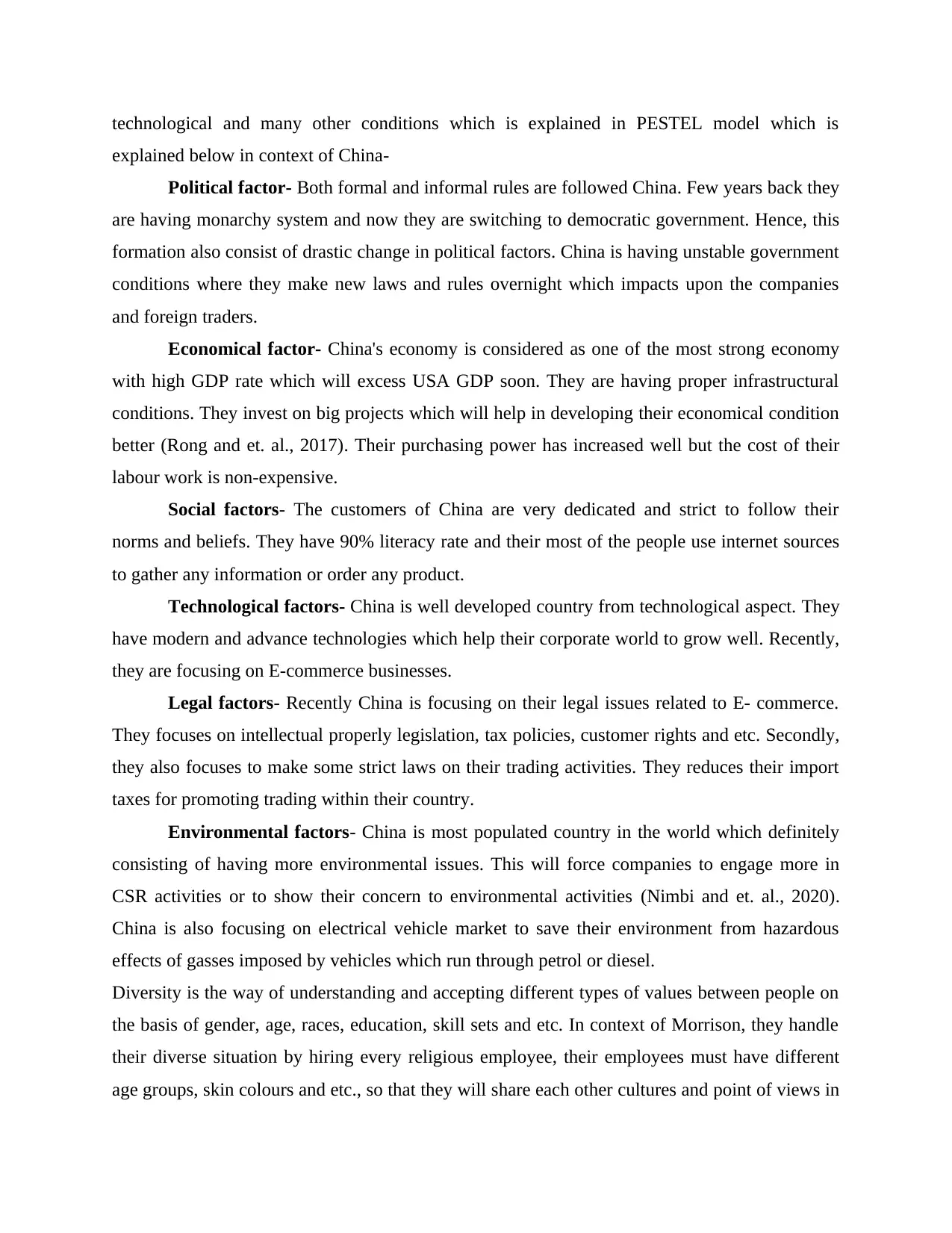
technological and many other conditions which is explained in PESTEL model which is
explained below in context of China-
Political factor- Both formal and informal rules are followed China. Few years back they
are having monarchy system and now they are switching to democratic government. Hence, this
formation also consist of drastic change in political factors. China is having unstable government
conditions where they make new laws and rules overnight which impacts upon the companies
and foreign traders.
Economical factor- China's economy is considered as one of the most strong economy
with high GDP rate which will excess USA GDP soon. They are having proper infrastructural
conditions. They invest on big projects which will help in developing their economical condition
better (Rong and et. al., 2017). Their purchasing power has increased well but the cost of their
labour work is non-expensive.
Social factors- The customers of China are very dedicated and strict to follow their
norms and beliefs. They have 90% literacy rate and their most of the people use internet sources
to gather any information or order any product.
Technological factors- China is well developed country from technological aspect. They
have modern and advance technologies which help their corporate world to grow well. Recently,
they are focusing on E-commerce businesses.
Legal factors- Recently China is focusing on their legal issues related to E- commerce.
They focuses on intellectual properly legislation, tax policies, customer rights and etc. Secondly,
they also focuses to make some strict laws on their trading activities. They reduces their import
taxes for promoting trading within their country.
Environmental factors- China is most populated country in the world which definitely
consisting of having more environmental issues. This will force companies to engage more in
CSR activities or to show their concern to environmental activities (Nimbi and et. al., 2020).
China is also focusing on electrical vehicle market to save their environment from hazardous
effects of gasses imposed by vehicles which run through petrol or diesel.
Diversity is the way of understanding and accepting different types of values between people on
the basis of gender, age, races, education, skill sets and etc. In context of Morrison, they handle
their diverse situation by hiring every religious employee, their employees must have different
age groups, skin colours and etc., so that they will share each other cultures and point of views in
explained below in context of China-
Political factor- Both formal and informal rules are followed China. Few years back they
are having monarchy system and now they are switching to democratic government. Hence, this
formation also consist of drastic change in political factors. China is having unstable government
conditions where they make new laws and rules overnight which impacts upon the companies
and foreign traders.
Economical factor- China's economy is considered as one of the most strong economy
with high GDP rate which will excess USA GDP soon. They are having proper infrastructural
conditions. They invest on big projects which will help in developing their economical condition
better (Rong and et. al., 2017). Their purchasing power has increased well but the cost of their
labour work is non-expensive.
Social factors- The customers of China are very dedicated and strict to follow their
norms and beliefs. They have 90% literacy rate and their most of the people use internet sources
to gather any information or order any product.
Technological factors- China is well developed country from technological aspect. They
have modern and advance technologies which help their corporate world to grow well. Recently,
they are focusing on E-commerce businesses.
Legal factors- Recently China is focusing on their legal issues related to E- commerce.
They focuses on intellectual properly legislation, tax policies, customer rights and etc. Secondly,
they also focuses to make some strict laws on their trading activities. They reduces their import
taxes for promoting trading within their country.
Environmental factors- China is most populated country in the world which definitely
consisting of having more environmental issues. This will force companies to engage more in
CSR activities or to show their concern to environmental activities (Nimbi and et. al., 2020).
China is also focusing on electrical vehicle market to save their environment from hazardous
effects of gasses imposed by vehicles which run through petrol or diesel.
Diversity is the way of understanding and accepting different types of values between people on
the basis of gender, age, races, education, skill sets and etc. In context of Morrison, they handle
their diverse situation by hiring every religious employee, their employees must have different
age groups, skin colours and etc., so that they will share each other cultures and point of views in
⊘ This is a preview!⊘
Do you want full access?
Subscribe today to unlock all pages.

Trusted by 1+ million students worldwide
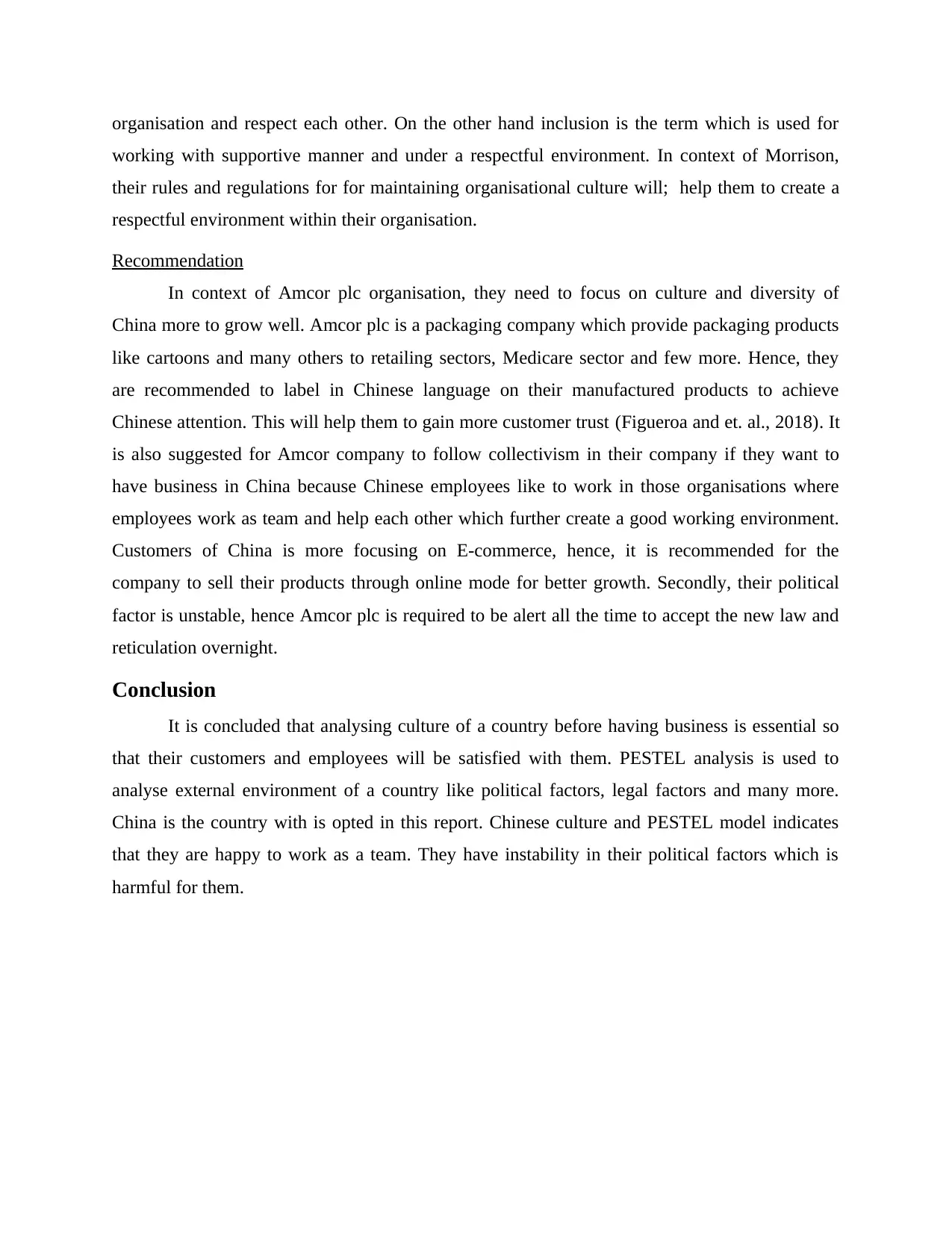
organisation and respect each other. On the other hand inclusion is the term which is used for
working with supportive manner and under a respectful environment. In context of Morrison,
their rules and regulations for for maintaining organisational culture will; help them to create a
respectful environment within their organisation.
Recommendation
In context of Amcor plc organisation, they need to focus on culture and diversity of
China more to grow well. Amcor plc is a packaging company which provide packaging products
like cartoons and many others to retailing sectors, Medicare sector and few more. Hence, they
are recommended to label in Chinese language on their manufactured products to achieve
Chinese attention. This will help them to gain more customer trust (Figueroa and et. al., 2018). It
is also suggested for Amcor company to follow collectivism in their company if they want to
have business in China because Chinese employees like to work in those organisations where
employees work as team and help each other which further create a good working environment.
Customers of China is more focusing on E-commerce, hence, it is recommended for the
company to sell their products through online mode for better growth. Secondly, their political
factor is unstable, hence Amcor plc is required to be alert all the time to accept the new law and
reticulation overnight.
Conclusion
It is concluded that analysing culture of a country before having business is essential so
that their customers and employees will be satisfied with them. PESTEL analysis is used to
analyse external environment of a country like political factors, legal factors and many more.
China is the country with is opted in this report. Chinese culture and PESTEL model indicates
that they are happy to work as a team. They have instability in their political factors which is
harmful for them.
working with supportive manner and under a respectful environment. In context of Morrison,
their rules and regulations for for maintaining organisational culture will; help them to create a
respectful environment within their organisation.
Recommendation
In context of Amcor plc organisation, they need to focus on culture and diversity of
China more to grow well. Amcor plc is a packaging company which provide packaging products
like cartoons and many others to retailing sectors, Medicare sector and few more. Hence, they
are recommended to label in Chinese language on their manufactured products to achieve
Chinese attention. This will help them to gain more customer trust (Figueroa and et. al., 2018). It
is also suggested for Amcor company to follow collectivism in their company if they want to
have business in China because Chinese employees like to work in those organisations where
employees work as team and help each other which further create a good working environment.
Customers of China is more focusing on E-commerce, hence, it is recommended for the
company to sell their products through online mode for better growth. Secondly, their political
factor is unstable, hence Amcor plc is required to be alert all the time to accept the new law and
reticulation overnight.
Conclusion
It is concluded that analysing culture of a country before having business is essential so
that their customers and employees will be satisfied with them. PESTEL analysis is used to
analyse external environment of a country like political factors, legal factors and many more.
China is the country with is opted in this report. Chinese culture and PESTEL model indicates
that they are happy to work as a team. They have instability in their political factors which is
harmful for them.
Paraphrase This Document
Need a fresh take? Get an instant paraphrase of this document with our AI Paraphraser
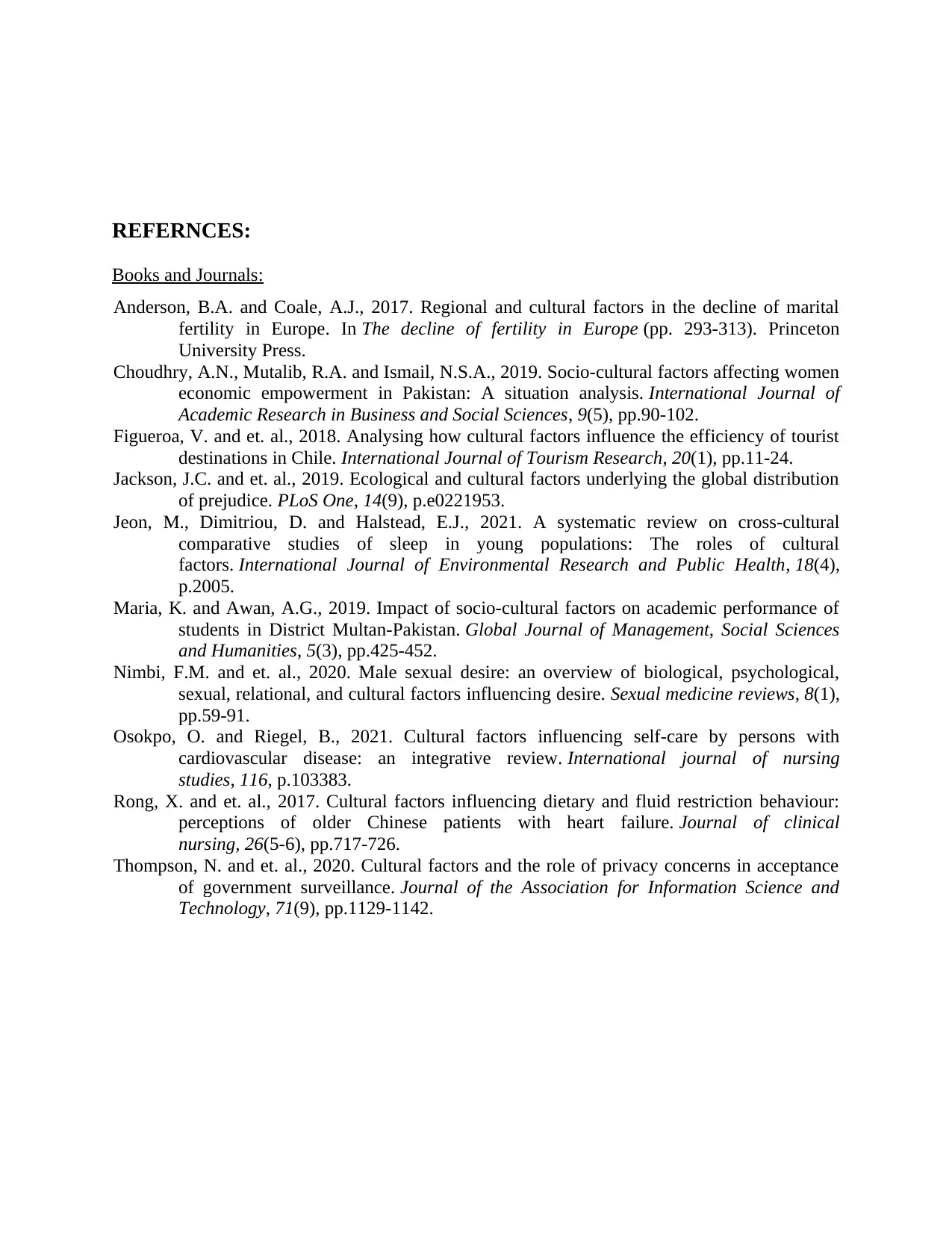
REFERNCES:
Books and Journals:
Anderson, B.A. and Coale, A.J., 2017. Regional and cultural factors in the decline of marital
fertility in Europe. In The decline of fertility in Europe (pp. 293-313). Princeton
University Press.
Choudhry, A.N., Mutalib, R.A. and Ismail, N.S.A., 2019. Socio-cultural factors affecting women
economic empowerment in Pakistan: A situation analysis. International Journal of
Academic Research in Business and Social Sciences, 9(5), pp.90-102.
Figueroa, V. and et. al., 2018. Analysing how cultural factors influence the efficiency of tourist
destinations in Chile. International Journal of Tourism Research, 20(1), pp.11-24.
Jackson, J.C. and et. al., 2019. Ecological and cultural factors underlying the global distribution
of prejudice. PLoS One, 14(9), p.e0221953.
Jeon, M., Dimitriou, D. and Halstead, E.J., 2021. A systematic review on cross-cultural
comparative studies of sleep in young populations: The roles of cultural
factors. International Journal of Environmental Research and Public Health, 18(4),
p.2005.
Maria, K. and Awan, A.G., 2019. Impact of socio-cultural factors on academic performance of
students in District Multan-Pakistan. Global Journal of Management, Social Sciences
and Humanities, 5(3), pp.425-452.
Nimbi, F.M. and et. al., 2020. Male sexual desire: an overview of biological, psychological,
sexual, relational, and cultural factors influencing desire. Sexual medicine reviews, 8(1),
pp.59-91.
Osokpo, O. and Riegel, B., 2021. Cultural factors influencing self-care by persons with
cardiovascular disease: an integrative review. International journal of nursing
studies, 116, p.103383.
Rong, X. and et. al., 2017. Cultural factors influencing dietary and fluid restriction behaviour:
perceptions of older Chinese patients with heart failure. Journal of clinical
nursing, 26(5-6), pp.717-726.
Thompson, N. and et. al., 2020. Cultural factors and the role of privacy concerns in acceptance
of government surveillance. Journal of the Association for Information Science and
Technology, 71(9), pp.1129-1142.
Books and Journals:
Anderson, B.A. and Coale, A.J., 2017. Regional and cultural factors in the decline of marital
fertility in Europe. In The decline of fertility in Europe (pp. 293-313). Princeton
University Press.
Choudhry, A.N., Mutalib, R.A. and Ismail, N.S.A., 2019. Socio-cultural factors affecting women
economic empowerment in Pakistan: A situation analysis. International Journal of
Academic Research in Business and Social Sciences, 9(5), pp.90-102.
Figueroa, V. and et. al., 2018. Analysing how cultural factors influence the efficiency of tourist
destinations in Chile. International Journal of Tourism Research, 20(1), pp.11-24.
Jackson, J.C. and et. al., 2019. Ecological and cultural factors underlying the global distribution
of prejudice. PLoS One, 14(9), p.e0221953.
Jeon, M., Dimitriou, D. and Halstead, E.J., 2021. A systematic review on cross-cultural
comparative studies of sleep in young populations: The roles of cultural
factors. International Journal of Environmental Research and Public Health, 18(4),
p.2005.
Maria, K. and Awan, A.G., 2019. Impact of socio-cultural factors on academic performance of
students in District Multan-Pakistan. Global Journal of Management, Social Sciences
and Humanities, 5(3), pp.425-452.
Nimbi, F.M. and et. al., 2020. Male sexual desire: an overview of biological, psychological,
sexual, relational, and cultural factors influencing desire. Sexual medicine reviews, 8(1),
pp.59-91.
Osokpo, O. and Riegel, B., 2021. Cultural factors influencing self-care by persons with
cardiovascular disease: an integrative review. International journal of nursing
studies, 116, p.103383.
Rong, X. and et. al., 2017. Cultural factors influencing dietary and fluid restriction behaviour:
perceptions of older Chinese patients with heart failure. Journal of clinical
nursing, 26(5-6), pp.717-726.
Thompson, N. and et. al., 2020. Cultural factors and the role of privacy concerns in acceptance
of government surveillance. Journal of the Association for Information Science and
Technology, 71(9), pp.1129-1142.
1 out of 8
Related Documents
Your All-in-One AI-Powered Toolkit for Academic Success.
+13062052269
info@desklib.com
Available 24*7 on WhatsApp / Email
![[object Object]](/_next/static/media/star-bottom.7253800d.svg)
Unlock your academic potential
Copyright © 2020–2025 A2Z Services. All Rights Reserved. Developed and managed by ZUCOL.





